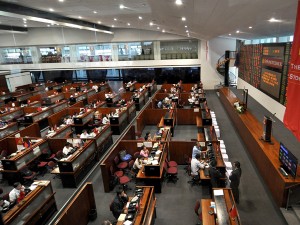MANILA, Philippines—The Philippine Stock Exchange is proposing some “safety valve” mechanisms to ensure compliance with foreign equity restrictions without discouraging capital flows within the regulatory framework being drawn up by the Securities and Exchange Commission.
These mechanisms could be a depositary receipt structure or some sort of quasi-debt- quasi-equity structure where voting shares can be minimal, PSE president Hans Sicat told reporters Thursday night.
“I think with the help of the SEC, we’ll end up with a logical solution,” Sicat said. “There’s a good discussion with SEC on what to do and I think, hopefully, we’ll end up with a safety valve mechanism.”
The SEC has vowed to come up in the next six months with “proactive, fair, reasonable and clear-cut” compliance framework on foreign capital computation amid concerns that an overly strict interpretation of a recent Supreme Court ruling on Philippine Long Distance Telephone Co. would set back local capital markets.
The draft circular earlier issued by the SEC on foreign equity limit compliance is seen affecting at least 13 percent of publicly listed companies.
“In any case, I think the SEC is responsive to the comments not just of the PSE but of the issuers and global investors. They realize that defining capital is not only very important but will be quite in line with the global trend of easing global flow (restrictions) and minimizing transactions costs,” Sicat said.
Acting on a petition filed by the late human rights lawyer Wilson Gamboa, the Supreme Court has ruled with finality that non-voting shares do not count as equity when computing for a company’s Filipino ownership level—for purpose of compliance with the 40-percent foreign equity limit on key industries like property and utilities.
The bone of contention is the legal interpretation of the 60-40 percent local-foreign ownership breakdown cited in the Oct. 9, 2012, ruling of the Supreme Court a motion for reconsideration. The SEC’s first draft closely followed the provision in the latest SC issuance calling for the uniform application of the 60-40 percent requirement in favor of Filipino citizens to each class of shares, regardless of differences in voting rights, privileges and restrictions.
Section 4 of the SEC draft circular on corporations that are nationalized or partly nationalized industries says: “All covered corporations shall at all times observe the constitutional or statutory ownership restrictions for each class of shares, provided that if any class of shares is divided into series of shares and a particular series of shares has different rights, privileges and limitations, the covered corporation must observe the same ownership restrictions for said series of shares.”
If the SEC were to stick to its current draft, PLDT’s recent move to restructure capital through the issuance of voting preferred shares to its Beneficial Trust Fund will not suffice as compliance with the foreign ownership limit. The draft, however, allows a five-year curing period to companies affected by the redefinition of capital.
